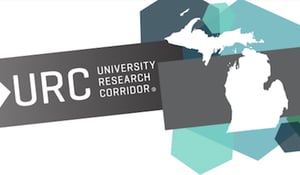
to Provide High-Demand Graduates, Keep State Competitive
MACKINAC ISLAND, Mich. — Business leaders from across the state spoke out today about the need to expand investment in Michigan’s universities — especially the state’s top research universities – so businesses will be able to tap the highly educated college graduates and research they need to keep up with the growing demand for workers.
Both Gov. Gretchen Whitmer and the state Senate have proposed using some of Michigan’s budget surplus to give universities a major boost during this unprecedented time in the state’s budget history.
In addition to significantly increasing funds for university operations, the Senate has proposed spending $360 million for the Michigan Achievement Scholarship, which will make a university education more affordable for Michigan families. The scholarship is estimated to benefit 100,000 full-time students, saving them tens of thousands of dollars they otherwise might have to take out in loans. It also will raise enrollment and increase the number of expected graduates by 15,000 over the next five years.
Michigan business leaders say the state must make such investments if job providers are to have the workers they need to compete. Among them is Sue Schweim Tellier, president of JetCo Federal, a Grand Rapids supply chain management, logistics, and packaging services company serving the defense industry. A leader of Women in Defense at the state and national levels, Tellier said Michigan isn’t doing what’s needed to encourage people to get college degrees so they can start their own companies, work in advanced manufacturing, and do critical research that can lead to new discoveries.
“I hope our lawmakers realize that one of the most important assets a state can have is universities that produce graduates who keep the economic engine running,” said Tellier, who holds degrees from Michigan State and Wayne State universities. “While I want to see all universities supported well, our top-ranked research universities invest more to train graduates in high-demand jobs such as those in the defense industry and deserve to have that reflected in their state funding. We need to invest in our universities and students to have access to more of the talent we need.”
Carla Walker-Miller, founder and CEO of Walker-Miller Energy Services in Detroit, said a college degree can be valuable to success in the fast-growing energy industry. She reinvented her company during the height of the 2008-2009 Great Recession, pivoting from electrical transmission and distribution equipment sales to energy efficiency management. She now heads one of the largest Black- and women-owned clean energy companies in the country.
“While there are many opportunities in the energy industry that do not require a college degree, a college degree significantly expands your options. Our state will thrive when everyone thrives, and one of the surest paths to economic success is higher education,” she said. “It’s imperative that Michigan increase its college funding so more students can get the financial aid they need to graduate. When this occurs, businesses such as mine can hire talented students from all communities to keep us on the cutting edge of technology and solve our greatest challenges.”
Brad King is CEO at Orbion Space Technology, a company based in Houghton that has more than 40 engineers on staff, including seven who hold doctoral degrees in electric space propulsion. The University of Michigan graduate says his company is based in Michigan’s Upper Peninsula but has an impact farther than the eye can see.
“Orbion’s engineers have built space hardware that has flown to every corner of the solar system,” King said. “Hiring the best talent is what makes it possible for Orbion to succeed in fulfilling its mission and contributing to the space industry. And talent is everywhere. We just need to make sure every talented person has the opportunity to earn a college degree.”

As executive director of the University Research Corridor, an affiliation between Michigan’s top research universities — Michigan State University, the University of Michigan, and Wayne State University – Britany Affolter-Caine (left) said now is the time to tap Michigan’s budget surplus and boost funding for higher education.
The 2022 URC Economic Impact Report prepared by East Lansing-based Anderson Economic Group showed that, for every dollar that the state has invested in URC institutions, the URC has put $22 back into the state economy. The three URC universities grant nearly 12,000 degrees in high-tech areas annually, as well as nearly 13,000 degrees in high-demand areas such as business, computer science, and engineering, and nearly 2,500 medical degrees.
“Those are the kinds of graduates needed to create autonomous vehicles, medical devices, better agricultural crops, and solutions to the challenges our communities and businesses face today,” Affolter-Caine said. “These are the graduates Michigan must have if it wants to compete to win.”
The three URC institutions enroll more than 139,000 students, and URC alumni account for nearly $1 out of every $5 in earnings and income statewide — $48.3 billion in fiscal year 2021. URC alumni also founded new businesses at nearly twice the national rate, contributing to the state's economic growth.
Glenn Stevens, executive director of MICHauto, said the fast-changing auto and mobility industry needs fewer production workers and more high-tech workers every day. He noted that, if Michigan universities aren’t given the resources they need to produce these workers, Michigan companies will look elsewhere for talent.
“If we’re going to remain a strong auto state, we need graduates in fields such as artificial intelligence, battery science, autonomous vehicles, and computer software design. Only then can we compete nationally and globally,” he said. “Substantially increasing our investment in higher education means an ever-increasing number of graduates who can fill those jobs and make Michigan a prosperous high-tech state that thrives in the economy of the 21st century.”
About Michigan’s University Research Corridor
Michigan’s University Research Corridor (URC) is an alliance of Michigan State University, the University of Michigan and Wayne State University and the leading engine for innovation in Michigan and the Great Lakes region. The URC is focused on increasing economic prosperity and connecting Michigan to the world. More information can be found at: urcmich.org | @urcmich | LinkedIn | Facebook














